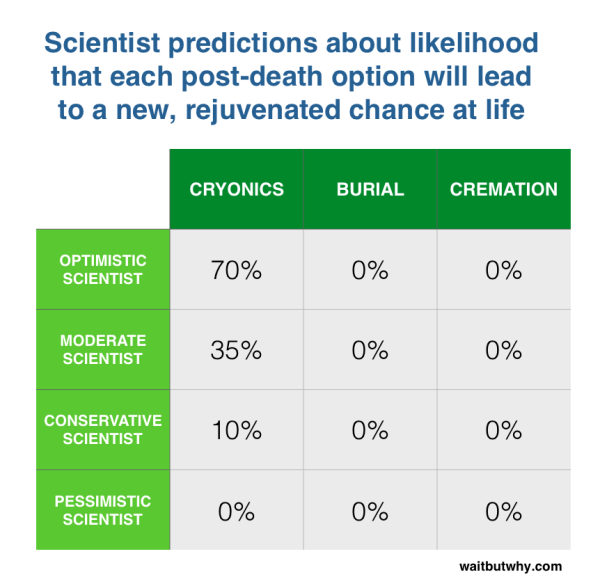

- the “conventional way”: Science finds a way to cure aging and rejuvenate the body before you die.
- Human level artificial intelligence is invented and leads to a rapid technological process (sometimes called “the Singularity” or an “Intelligence Explosion”). Once we get there, finding a cure for aging will become trivial.
- You actually die, but thanks to cryonics you get revived some time in the future when (1) or (2) has already happened.
#1 way to live forever: Science & rejuvenation biotechnology
“Just as a vintage car can be kept in good condition indefinitely with periodic preventative maintenance, there is no reason why, in principle, the same can’t be true of the human body. We are, after all, biological machines.” – Aubrey de Grey, a leading rejuvenation biotechnology researcher
The science of longevity is quickly gaining momentum and has recently made some exciting progresses. This video provides a brief overview:
-
https://www.lifespan.io/ : an rejuvenation biotechnology advocacy & education website
-
https://www.fightaging.org/ an educational website on how to fight aging.
-
http://www.sens.org/ website of Aubrey de Greys (one of the key figures in the scene) organization. SENS is the biggest driver of rejuvenation biotechnologies out there right now.
-
https://mfoundation.org/ : a non-profit-organisation providing grants and raising money for projects aiming to extend human healthy lifespan.
-
https://www.humanlongevity.com/ Craig Venters company aiming to develop anti-aging drugs.
-
http://www.calicolabs.com/ Googles multi-billion dollar endeavour to tackle aging.
-
https://unitybiotechnology.com/ another rejuvenation biotechnology company
Here is Aubrey de Grey’s Ted Talk on the topic. The talk is already a view years old, but mostly still relevant. Aubrey de Grey is one ot the most popular figures in the “Fight Aging” movement. He is the founder of SENS:
This article https://www.leafscience.org/not-in-my-lifetime/ titled “The ‘Science Will Not Defeat Aging in my Lifetime so Why Bother?’ Argument, and Why We Should be More Optimistic” is also worth reading.
-
Given the complexity of aging, many have questioned whether curing aging is even realistic (Warner et al., 2005; Olshansky et al., 2006; Holliday, 2009). There is no scientific reason, however, to think that aging cannot be cured (reviewed in de Magalhaes, 2014a). After all, curing aging does not violate any law of physics.
-
At the moment, curing aging is still “pretty far off”. But so was the claim that “everyone will have a supercomputer in their pockets”, when the first computer (which was very big) was build. And nobody in 1920 would have even remotely imagined a heart transplantation. And yet it happened just 47 years later. There is also the “Law of Accelerating Returns” – the law that technology tends to grow exponentially. In the next 10 years we might make similar progress like we did in the past 20 years. In the next 50 years the world might change in similar ways like it did in the past 200 years! This concept of exponential growth is nicely explained here.
-
The quest to find a cure for aging is only just starting to gain momentum. But once the “human colossus” starts to fully work on the problem, progress will occur much faster. In particular the fact that big figures like Craig Venter or Google (only fairly recently!) tapped into this area makes me hopeful that funding & interest in this field will rapidly increase in the future.
-
Almost all current research (rightfully) goes into “increasing healthy lifespan” (the time we spent active and not sick) rather than “increasing total lifespan”. But progress in one area often also benefits the other and I suspect that most scientists working on the first area secretly hope for progress on the latter. Note there is a strong economic incentive to increasing healthy lifespan (hence, Google & Co are on the field).
-
Some living organism can already get fairly old: The Aldabra giant tortoise can live 200+ years, some lobsters 100+, Greenland sharks ~400 years, the clam arctica islandica 507 years (source). So there is at least a “proof of concept”.
-
All this talk is really about “negligible senescence”, aka: “Reversing the effects of aging”. This has nothing to do with “immortality”. Being hit by an Asteroid will most likely kill you even in 5000 years (unless you have a copy of your brain & state of consciousness somewhere else).
#2 way to live forever: Intelligence Explosion (or Singularity)
-
It is unclear when & if AI will reach human-level intelligence”. But if it does so, it seems likely this will quickly also lead to “superintelligence”. See the explanation in the Wait But Why article above.
-
Once we have superintelligence, “we have everything”, including most likely a cure for aging.
-
According to many experts, artificial intelligence poses a serious (the most serious?!) existential risk. And no: “Just putting it in a box and unplugging it if it misbehaves” will not get you very far. At the same time, artificial human level intelligence could be “the best thing that ever happened to humanity.”
Here is a survey of the 100 most cited AI scientists asked when human-level-machine-intelligence will be invented:
| Median response | Mean response | Standart deviation | |
|---|---|---|---|
| 10% chance of human-level machine intelligence | 2024 | 2034 | 33 years |
| 50% chance of human-level machine intelligence | 2050 | 2072 | 110 years |
| 90% chance of human-level machine intelligence | 2070 | 2168 | 342 years |
You can see the experts give a 50% chance of human-level AI happening by 2050, just 32 years in the future. Admittedly, they are very uncertain, but high uncertainty also means it could arrive sooner rather than later.
-
If you want to get excited about this topic, Ray Kurzweil is the man you have to follow! Here are his Ted talks and further links on him.
-
google “singularity” – there are a ton of articles on this topic out there.
#3 way to live forever: Cryonics
-
Wait But Why’s all-round explainer of cryonics. Goes way beyond just the technical details.
-
a nice youtube video explaining the technical details
-
Link to Alcor, one of the leading companies that offer cryopreservation
To me, the most important thing to know about cryonics is summarized in this graph taken from waitbutwhy.com:

